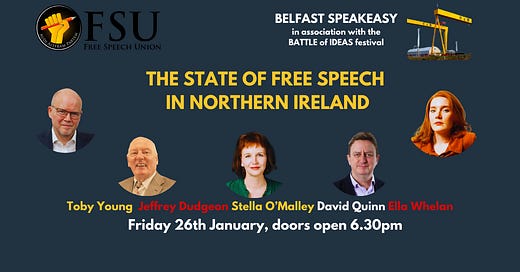Northern Ireland's free-speech problem
Ella Whelan shares her thoughts ahead of our event in Belfast on Friday 26 January
This Friday, the Free Speech Union and Belfast Speakeasy, in association with the Battle of Ideas festival, will be holding a discussion on the state of free speech in Northern Ireland.
Belfast is an interesting place to hold a discussion about freedom of speech - and about where threats to open debate come from. On 19 October 1988, the then Tory home secretary, Douglas Hurd, announced a broadcasting ban on ‘organisations in Northern Ireland believed to support terrorism’. While the ban covered some loyalist groups, the main target was Sinn Féin - with the BBC and other organisations forced to use actors to voice individuals like Gerry Adams.
As Irish journalist Ed Moloney explains, while the ban was already informally in effect (the BBC and ITV hadn’t interviewed the IRA since 1974), it ‘extended censorship to a whole new category, to groups that were not only perfectly legal but had elected representatives in their ranks’. In the midst of an ugly and drawn-out war, the ban was a weapon to weaken republican sentiment by censorship. As Moloney puts it, ‘the law had been explicitly employed to control what the public was able to listen to or view’. Tory Prime Minister John Major eventually lifted the ban six years later in 1994, only after the Provisional IRA had declared a ceasefire.
Fast forward to 2024, and the state of free speech in Northern Ireland seems no less unstable. Ironically, it is now Sinn Féin who are accused of using legislation to silence public discussion about the Troubles. The most recent defamation case was brought by Sinn Féin’s spokesperson for policing and justice, Gerry Kelly, against journalist Malachi O’Doherty, for naming Kelly as the gunman in an escape from the Maze prison in 1983. Kelly has always denied the accusation, despite writing several books about the event. The court threw the case out, describing Kelly’s libel accusation as an ‘utterly unjust’ attempt to silence a critic. Sinn Féin have been accused by some press freedom groups of using strategic lawsuits against public participation (known as SLAPPs) as a form of legal intimidation to prevent political criticism.
Today, clampdowns on free speech have become so commonplace as to almost seem mundane. Censorship of the press is used not as a means of state warfare, but to protect sexual-assault victims. As Andrew Tettenborn pointed out in the Spectator late last year, the Northern Ireland Justice (Sexual Offences and Trafficking Victims) Act extends anonymity for victims of sexual offences beyond their death, and now applies to ‘reports about anyone investigated by, or even reported to, the Northern Irish police (PSNI) for a sexual offence’. In essence, a journalist or editor might find themselves in hot water for commenting on any aspect of a sexual-offence case, whether accusations were truthful or vexatious, decades after both claimant and defendant are dead.
Outside of Stormont, university activists and middle-aged feminists are now more likely to be silenced than former paramilitaries. The fact that a rally called ‘Let Women Speak’, organised by women concerned about infringements on their rights by gender ideology, caused such widespread outrage shows how far the dial has shifted. Calling a man a man and a woman a woman can get you into serious trouble.
In the Republic, teacher Enoch Burke ended up in Mountjoy Prison after he protested his Church of Ireland school’s decision to sack him for refusing to use the preferred pronouns of a student. While discussion about gender, sexuality and women’s rights was more likely to be silenced by priests and preachers 50 years ago, it is now young activists and right-on politicians calling the shots as to what is acceptable and what is ‘hateful’. Indeed, Ireland’s plans for new hate-crime legislation could pose one of the most serious threats to open debate in modern Europe, with ‘hate’ being so loosely defined as to encompass almost any form of contentious or thorny political discourse.
The broadcasting ban of the 1980s was met with significant concern and criticism - the National Union of Journalists called for a day of protest and lobby politicians to retract the policy. Today, you’re more likely to find articles in the Irish Times calling for greater clampdowns (they call it protections) on free speech, in the name of ‘vulnerable’ or ‘marginalised’ communities. But there has long been a culture of censorship in Northern Ireland - from the biggest questions of politics and state (criticise the Good Friday Agreement and risk being accused of inflaming tensions) to the current policing of the minutiae of personal relationships (from misgendering to social-media conduct).
What Ireland needs is more speech, not less. But we must realise that attacks on free speech no longer simply come from oppressive states or hostile courts, but from a culture of conformism in which hitting the ban button is seen as the easiest way to deal with difficult or conflicting viewpoints. How can we mount a new defence for freedom in the twenty-first century? Join me and the rest of the panel this Friday at the Titanic Hotel in Belfast to discuss. Can’t be there? Make sure to subscribe to this Substack for recordings and videos of all of our events.
The State of Free Speech in Northern Ireland
TIME: Doors and bar open 6.30pm. Panel with Q & A, 7pm until 8.30pm, followed by social. Ends 10pm.
VENUE: Drawing Office One and Pavilion Bar, Titanic Hotel, 8 Queens Road, Belfast, Northern Ireland, BT3 9DT.
TICKETS: £6 for FSU members, £10 for non-members, £3 for students. Buy online via Eventbrite.
Join us for the Free Speech Union’s first Northern Ireland Speakeasy. On Friday 26 January, FSU be hosting a stellar panel to consider The State of Free Speech in Northern Ireland, covering everything from hate speech to press freedom, from the attempted silencing of women’s rights campaigners to digital censorship. Organised in association with the Battle of Ideas festival, the evening is your chance to hear from great speakers, to get your voice heard on free speech issues and to meet other free speech enthusiasts.
SPEAKERS:
Toby Young general secretary of the Free Speech Union.
Stella O’Malley psychotherapist and writer.
David Quinn journalist and commentator, founder of The Iona Institute.
Jeffrey Dudgeon politician, campaigner and author.
Ella Whelan journalist and author, co-convenor the Battle of Ideas festival.





